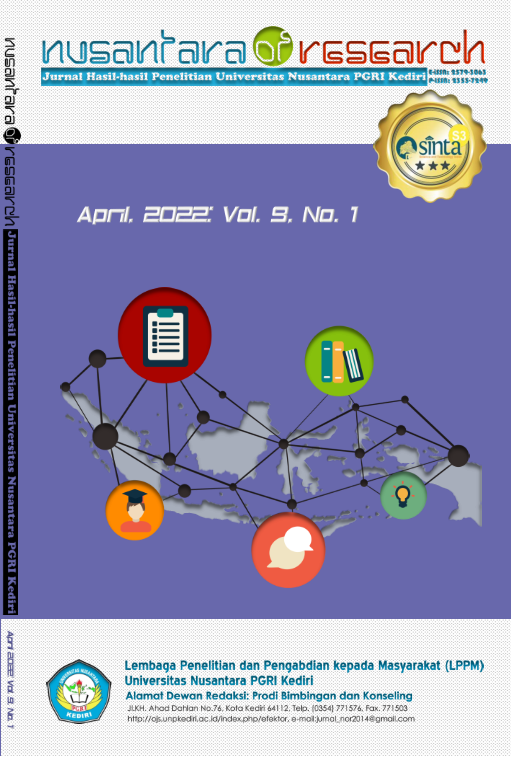The Role of Guidance and Counseling Teachers During the Covid-19 Pandemic: Phenomenological Studies of Madrasah Aliyah In East Java
Main Article Content
Abstract
The transition of learning during the COVID-19 pandemic from offline to online and then offline again certainly has its own impact on students. Guidance and Counseling (BK) teachers are expected to have a clear role. This study aims to determine the role of guidance and counseling teachers during the COVID-19 pandemic. To obtain data, the researcher conducted interviews with the selected research subjects because they had the capacity according to the research theme (purpose sampling). Based on the results of the interviews conducted, the researchers found: (1) The role of the BK teacher Ing ngarso sung tuladha, was carried out by providing good examples for students who came from their own initiative, the role was in accordance with the covert role or personal role where the behavior was made purely from sincerity and has a positive impact on the environment, (2) the role of the BK teacher Ing madya mangun karsa where when in his own environment he gives encouragement either directly or indirectly, this is in accordance with the role of overt or the role of the public that makes the surrounding environment feel excited, ( 3) The role of the BK teacher, tut wuri handayani, where the BK teacher shows his performance professionally so that colleagues are also encouraged to improve their performance, this role is in accordance with the descriptive role theory of descriptive roles or concepts that make the surrounding environment have a concept of what the subject is doing repeatedly.
Downloads
Article Details
Issue
Section
Authors who publish with this journal agree to the following terms:
- Copyright on any article is retained by the author(s).
- The author grants the journal, the right of first publication with the work simultaneously licensed under a Creative Commons Attribution License that allows others to share the work with an acknowledgment of the work’s authorship and initial publication in this journal.
- Authors are able to enter into separate, additional contractual arrangements for the non-exclusive distribution of the journal’s published version of the work (e.g., post it to an institutional repository or publish it in a book), with an acknowledgment of its initial publication in this journal.
- Authors are permitted and encouraged to post their work online (e.g., in institutional repositories or on their website) prior to and during the submission process, as it can lead to productive exchanges, as well as earlier and greater citation of published work.
- The article and any associated published material is distributed under the Creative Commons Attribution-ShareAlike 4.0 International License
How to Cite
References
Alfansyur, A., & Mariyani, M. (2020). Seni Mengelola Data: Penerapan Triangulasi Teknik, Sumber Dan Waktu Pada Penelitian Pendidikan Sosial. Historis: Jurnal Kajian, Penelitian dan Pengembangan Pendidikan Sejarah, 5(2), 146-150.
Creswell, J.B. (2009). Qualitative Research and Research Design (Choosing from Five Approaches) Third Edition. Jakarta: Learning library
Habsy, B. A. (2017). Seni memahami penelitian kuliatatif dalam bimbingan dan konseling: studi literatur. Jurnal Konseling Andi Matappa, 1(2), 90-100.
Habsy, B. A. (2020). Kajian Filosofis Ditengah Pandemi Covid-19 Berdasarkan ParadigmaKonseling Catur Murti. Nusantara of Research: Jurnal Hasil-hasil Penelitian Universitas Nusantara PGRI Kediri, 7(1), 19-29.
Hidayat. (2021). Dilema Pembelajaran Daring Pada Masa Pandemi Covid-19. Yogyakarta: CV Bildung Nusantara.
Herlina, S., & Ma’ruf, U. (2019). Law Enforcement Against Elections Crime During Electoral Campaign 2019 (Case Study In Bawaslu of Banjarmasin City). Jurnal Daulat Hukum, 2(3), 299-306.
Herzberg, F. I. (1966). Work and the Nature of Man.
Irawan, A. W., Habsy, B. A., Lestari, M., Aras, N. F., & Sona, D. (2021). Mengapa Anak Muda Mau Menjadi Guru? Analisis Resiliensi pada Guru di Samarinda. Jurnal Studi Guru dan Pembelajaran, 4(3), 675-683.
Maier, N.J.1998. Commitment in The Workplace: Theory Research and Application. Thousand Oaks, CA:Sage.9:21-23
Maslow, A. H. (2010). Motivazione e personalità. Armando editore.
Moustakas, C. (1994). Phenomenological research methods. Sage publications.
Muharam, S. (2020). Dilema Pembelajaran Di Masa Pandemi. Osteoarthritis and Cartilage, 28(2), 1-43.
Musyafa, H. (2015). Sang guru: novel biografi Ki Hadjar Dewantara, kehidupan, pemikiran, dan perjuangan pendiri Tamansiswa (1889-1959). Imania.
Samsussin, S., & Hendrayani, S. (2019). Dampak Pendidikan Terhadap Pola Pikir Pedagang. Journal Of Language Education and Development (JLed), 2(1), 232-241.
Seligman, M. E. (2006). Learned optimism: How to change your mind and your life. Vintage.
Siregar, H. D. P. (2020). Dilema Pembelajaran Online: Antara Efektifitas Dan Tantangan. Mimbar Agama Budaya, 57-63.
Stein, Steven J., and Howard E. Book. "Ledakan EQ: 15 Prinsip Dasar Kecerdasan Emosional Meraih Sukses, terj." Trinanda Rainy Januarsari dan Yudhi Murtanto. Bandung: Kaifa (2003).
Surat Edaran Nomor 4 Tahun 2020 tentang Pelaksanaan Kebijakan Pendidikan di Masa Darurat Penyebaran Corona Virus Disease (covid-19)
Kline, P. (2013). Handbook of psychological testing. Routledge.
Raidin, R., & Huda, M. (2021). Pemikiran Pendidikan Ki Hajar Dewantara dan Relevansinya Dengan Pendidikan Agama Islam Multikultural. Jurnal Al-Qiyam, 2(1), 110-119




